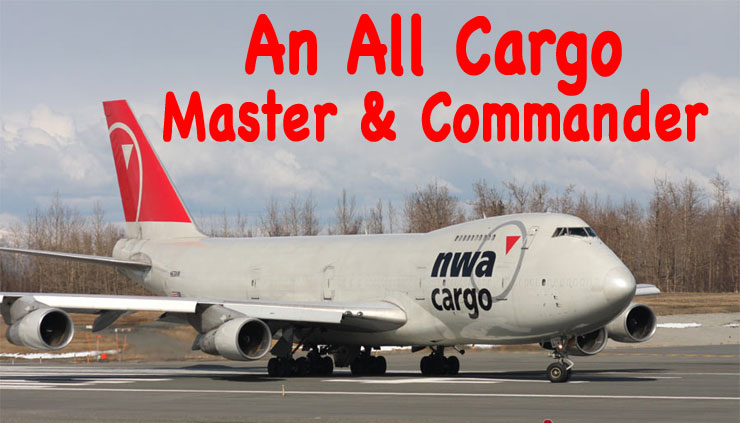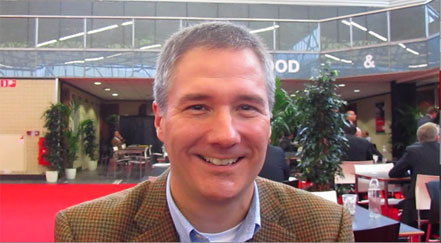
Earlier this year Kalitta Air acquired the retired fleet of 12 ex-Northwest
Airlines Cargo Boeing 747-200F freighters from Delta Air Lines.
 In
the big, wide world of USA all-cargo history, few top executives have
had the opportunity to be in charge of the fortunes of a great fleet of
B747Fs. In
the big, wide world of USA all-cargo history, few top executives have
had the opportunity to be in charge of the fortunes of a great fleet of
B747Fs.
As chief cargo officer of Northwest Airlines,
Jim Friedel oversaw fifteen freighters of one of the mightiest fleets
ever fielded by a combination U.S. flag carrier.
Today, he can offer a view of all-cargo
operations from a unique “been there, done that” perspective
shared by very few.
It is a probable certainty that unless something
else happens, Jim Friedel is also the last master & commander of a
great all-cargo resource within a U.S. combination carrier’s fleet.
Jim Friedel, with the addition of a couple
of letters in his surname, might have been Jim Friendly. He has the kind
of face that falls easily into a smile and works well with people.
But there is nothing forced or saccharine
about the guy.
Jim Friedel combines accessibility with
rock hard determination, and expresses himself in well-rounded thoughts.
Jim Friedel joined Northwest Airlines in
1991, moving to the cargo division in 1996. He became President in the
spring of 2000.
Air Cargo News FlyingTypers caught
up with Jim at the Amsterdam Air Cargo Forum last month.
We wondered where he has been since Northwest
was acquired and disappeared inside of Delta Airlines, and also, what
lies next?
“I have been on sabbatical now for
exactly two years, after having led Northwest Cargo until the end of ’07.
“Then I did a job called ‘strategy
planning,’ which became the NWA/DL merger analysis.
“When Delta didn’t pick me up,
I took some time off, which I had always planned to do.
“I’d gone from college (where
he studied economics) straight to a consulting job with no gap, and onto
Northwest with no gap.
“Now I am 45, and recalling that both
my parents died young, decided to take some time off and enjoy the kids
while they are not teenagers (kids are ten and eleven).
“So the past few years, we have taken
trips together and I coached soccer at their school; I have never been
busier, and never bored.
“But now, I guess the sabbatical should
come to an end.
“It’s been good, but nothing
can last forever.
“So I am here in Amsterdam at TIACA
ACF to discover what has been going on with air cargo and to find out
if I can play a role in the industry future, either as a consultant or
in some other capacity.
“I am proudest of the team at Northwest.
We were a group of people who felt that nothing was so impossible we couldn’t
give it try.
“So we were early into e-booking for
electronic freight and we also went out and continued to acquire and convert
freighters.
“Northwest Cargo worked closely with
our customers, including a successful arrangement with DHL Express that
was indicative of a group that went out and attacked challenges and was
persistent; if something didn’t work one way, we usually found another
track to take.
“We were one of the first airlines
on e- booking and moved up to 75 percent; our collections process was
quick and effective and all of it was driven by the right group of people
coming together at Northwest Cargo.”
So Jim Friedel is still young and after
all his experience, including taking some quality family time off, he
has a hankering to get back into cargo.
“I miss the air cargo business—I
know the people and the industry.
“There are more than a few great personalities
in air cargo today and I miss that.
“There are still opportunities in
air cargo, especially in e-freight and other areas, where I feel I can
play a role in helping capture important business.”
But we wonder: is there anything he wishes
he might have done differently at NWA?
“Since leaving cargo, I often wonder
if we might have missed some opportunity to renew the freighters.
“They were B747-200s and we looked
at options.
“At certain times, the company was
ash poor, so the options couldn’t be pursued.
“But more often than not, there really
weren’t better options that made better economic sense.
“Today, the best option that has come
along is the triple seven freighter, but that wasn’t on the menu
back then.
“I am not sure that there ever was
a solution that Northwest could have afforded.
“Every once in a while I wonder if
we missed an opportunity and still today I am not sure if the answer is
yes or no.
“On paper, the B747-400 did not look
much better than our re-engined 200s.
“The B747-400 conversion definitely
was not better and going to airplanes like the A330-200F didn’t
make sense because those didn’t exist.”
Looking at some of the issues of air cargo
in late 2010, Jim Friedel thinks on the move to expand CNS, the IATA special
interest group based in the USA, into a more global presence.
“CNS is a clearing house business
and, at this point, an annual conference business.
“The difficulty could be that there
are a fair amount of conferences that already exist.
“When it was formed, the CNS Partnership
filled a vacuum.
“I am not sure the situation today
is the same in Europe and Asia.
“So the people you want to bring into
a new agenda already have a fairly full dance card with other conferences,
and if you bring them into something, you better do it differently than
all the others, to be meaningful.
“The future as mentioned is full of
promise. E-freight is still mostly standing on the starting line.
“There is a blueprint for e-freight,
but not much has been done to come anywhere near the goals that were set
so many years ago for the project.
“Part of the problem is that everyone
uses a different IT service provider for the project; for example, if
you are a forwarder and one airline wants a direct connection and one
wants a TRAXON connection and one wants a Descartes, and one doesn’t
even have a connection, then it becomes a Rubix Cube complexity.
“Taking that one step further: now
suppose I have shippers who have to connect to forwarders and sometimes
connect straight to airlines, and extend that further to a fourth stakeholder,
a handler and a fifth stakeholder known as customs, and the number of
links in the web expands geometrically and becomes a nightmare.
“Air cargo needs to think about a
single service provider that all of the stakeholders can plug into on
an as-needed basis, and that service provider will connect to all the
players.
“It will have to be different from
the current CCS, which is built on the idea that everyone has mainframes
that can do timely EDI messaging,
“Simply put, that is not a valid premise.
“Air cargo needs to move on to a system
that can accommodate varying needs and capabilities for all the stakeholders.”
Geoffrey
|




